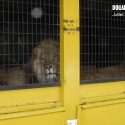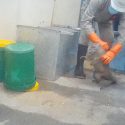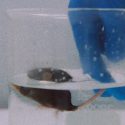One Voice and the Whale Sanctuary Project propose collaboration with Marineland Antibes
One Voice and the Whale Sanctuary Project propose collaboration with Marineland Antibes
07.02.2024
International
One Voice and the Whale Sanctuary Project propose collaboration with Marineland Antibes
Exploitation for shows
The French animal defender organization One Voice and the Whale Sanctuary Project, a U.S. charity, agreed several years ago to work together toward Inouk, Wikie and Keijo, the three orcas at Marineland Antibes, being retired from commercial display and transferred to a coastal sanctuary in Nova Scotia, Canada. In the wake of the judicial court of Grasse calling for a pause on the transfer of orcas from Marineland Antibes to Japan pending an independent expert assessment and the Ministry of Ecological Transition launching a consultation process to study non-commercial solutions for captive whales, our organizations now propose a collaboration with Marineland and the French Ministry of Ecological Transition.
«The Whale Sanctuary Project is the only current sanctuary project that can accommodate orcas. We are now working together in offering to cooperate with Marineland to retire the whales to a more natural environment that will be most beneficial to their health and welfare.»
Muriel Arnal, President of One Voice
Collaboration is an essential ingredient
The Whale Sanctuary Project emphasizes that the success of retiring the orcas to sanctuary will depend on a fully collaborative effort among the staff and management of Marineland, the Whale Sanctuary team, One Voice and other partners, along with government agencies.
This approach is modeled on earlier collaborative ventures. In 2019, the Whale Sanctuary Project worked with the Russian government, Russian animal protection groups and One Voice to successfully return to the ocean 10 orcas and 87 beluga whales who had been captured illegally for sale to marine entertainment parks in China. And in 2023, members of the Whale Sanctuary team worked hand-in-hand with Miami Seaquarium staff through Friends of Toki, in a joint effort to return the orca Toki (also known by her display name Lolita) to her home waters in the Pacific Northwest, from where she had been captured in 1970. (Sadly, Toki died from chronic conditions including renal disease and pneumonia before she could be moved.)
«The impact of what was a first-ever, formal collaboration between a marine entertainment park and the animal protection community to care for a whale on site at a marine park cannot be underestimated. It demonstrated that different organizations that in the past might have been working against each other can successfully work together with shared values of respect and care for the animals.»
Charles Vinick, Executive Director of the Whale Sanctuary Project
The sanctuary
The coastal sanctuary that the Whale Sanctuary Project is establishing is situated in Port Hilford Bay, Nova Scotia. This protected bay will offer its resident whales more than 100 acres (40 hectares) of water space with depths up to 18 meters, allowing the whales to swim, dive and experience a natural seaside environment. They will be able to explore the seafloor, chase birds on the surface and spend their time in nature while benefiting from human care for the rest of their lives.
It will also ensure that the family group stays together.
«Orcas are highly intelligent, emotionally sensitive and socially bonded animals. In the ocean, they live in strong family groups and their emotional and behavioral health is intimately connected with their social group.»
Dr. Lori Marino, Founder and President of the Whale Sanctuary Project
Transporting whales to a new situation inevitably causes stress. But any such stress is multiplied exponentially when their destination is another entertainment facility where they must try to accommodate to living long-term in a concrete tank with orcas with whom they are entirely unfamiliar.
“By contrast, at an authentic sanctuary like at Port Hilford Bay,” Dr. Marino explained, “they will be able to stay together as a unit and not be stressed by being confined in a small space with orcas with whom they have no relationship. A sanctuary will provide the best chance they have for a successful life.”
Sanctuary standards
The sanctuary is being designed according to standards prepared jointly by the National Aquarium, Sea Life Trust and the Whale Sanctuary Project, and published by the Global Federation of Animal Sanctuaries.
The National Aquarium is currently establishing a sanctuary in the Caribbean for its six dolphins, and Sea Life Trust operates a sanctuary in Iceland for two beluga whales who came from an entertainment park that was acquired by its founding partner Merlin Entertainments Group. Merlin Entertainments has a policy of not using cetaceans at any of its marine entertainment parks.
An accelerated plan to meet the needs of Wikie, Inouk and Keijo
Given the urgency facing Wikie, Inouk and Keijo, the Whale Sanctuary Project has developed an accelerated approach to provide the absolutely necessary elements for accommodating the whales before completing the full sanctuary plan.
Phase One of the accelerated plan will include the engineering, fabrication and installation of a bay pen of approximately 6,500 square meters, along with temporary staff quarters and facilities, so that the orcas can be moved to sanctuary. In Phase Two, permanent sanctuary facilities are installed, along with the perimeter net surrounding the 404,000 square meters (100+ acres) of sanctuary water space.
Environmental studies
Over a three-year period since announcing the selection of Port Hilford Bay, the Whale Sanctuary Project has been conducting comprehensive environmental studies to ensure the suitability of the site for whales – and equally to be sure that the presence of the whales will not be detrimental to the local flora and fauna.
One of these studies is specific to Nova Scotia because of historical gold mining that took place across the province from the 1880s through the 1930s. Analyses of soil, water and invertebrate species at the site concluded that while the water throughout the bay is clean, the area onshore where there was once a stamp mill will need to be capped with soil, gravel or concrete at any places that may be disturbed by construction. There are also levels of arsenic sequestered in a small area of the seabed and in some samples taken from invertebrates that inhabit the seabed. We are engaged in consultations with scientists and other experts to determine whether mitigation is required.
A global sanctuary movement
Over recent years, public opinion has fueled a global movement to bring an end to keeping cetaceans (whales, dolphins and porpoises) in captivity for the purpose of entertainment.
There are already hundreds of first-class sanctuaries all over the world for land animals, including for elephants, big cats, bears and great apes who had spent their earlier lives in zoos (both public and private) and circuses. In working cooperatively and in collaboration with the entertainment industry, we look forward to a time when cetaceans are no longer confined to concrete tanks and have all been retired to authentic sanctuaries.









